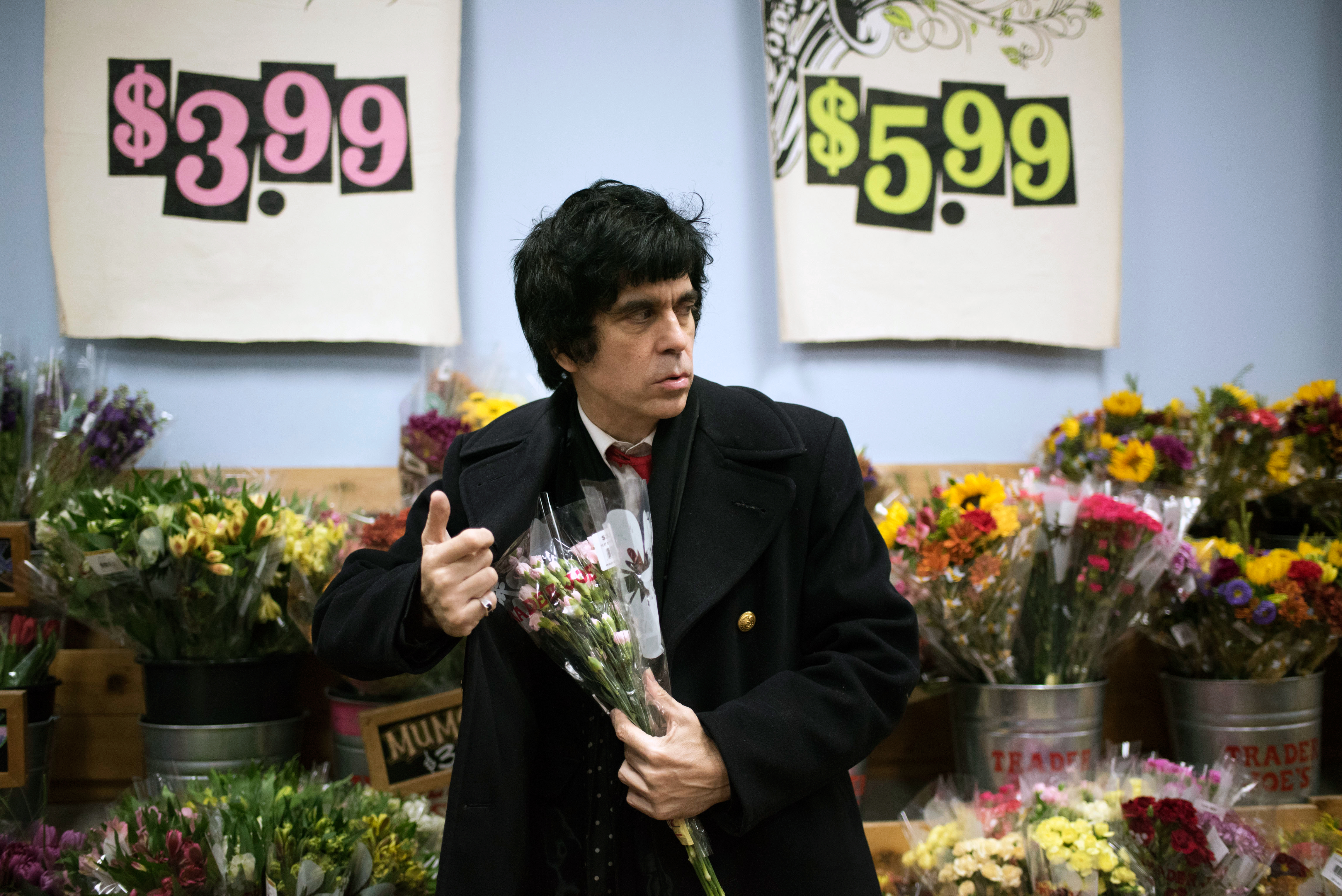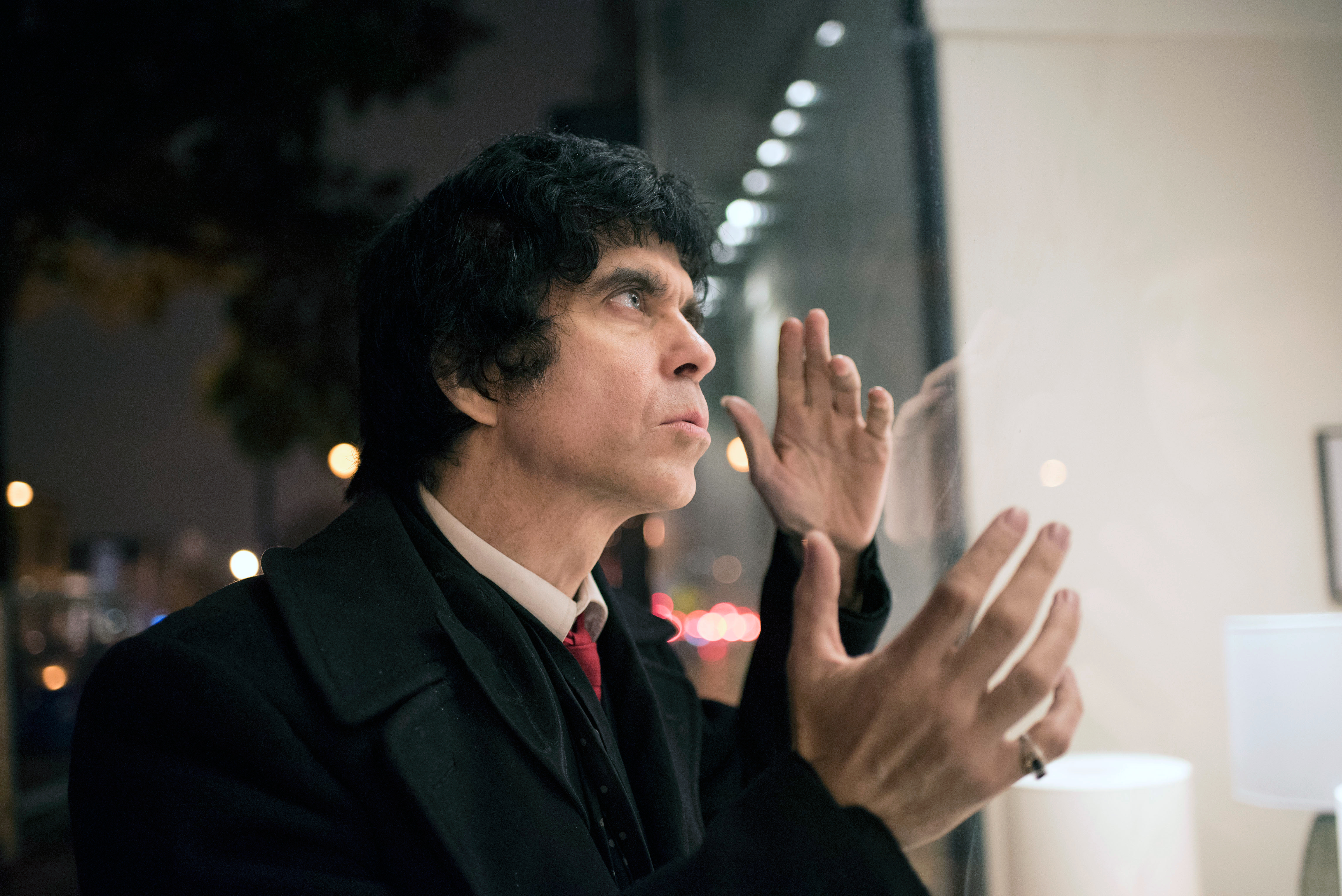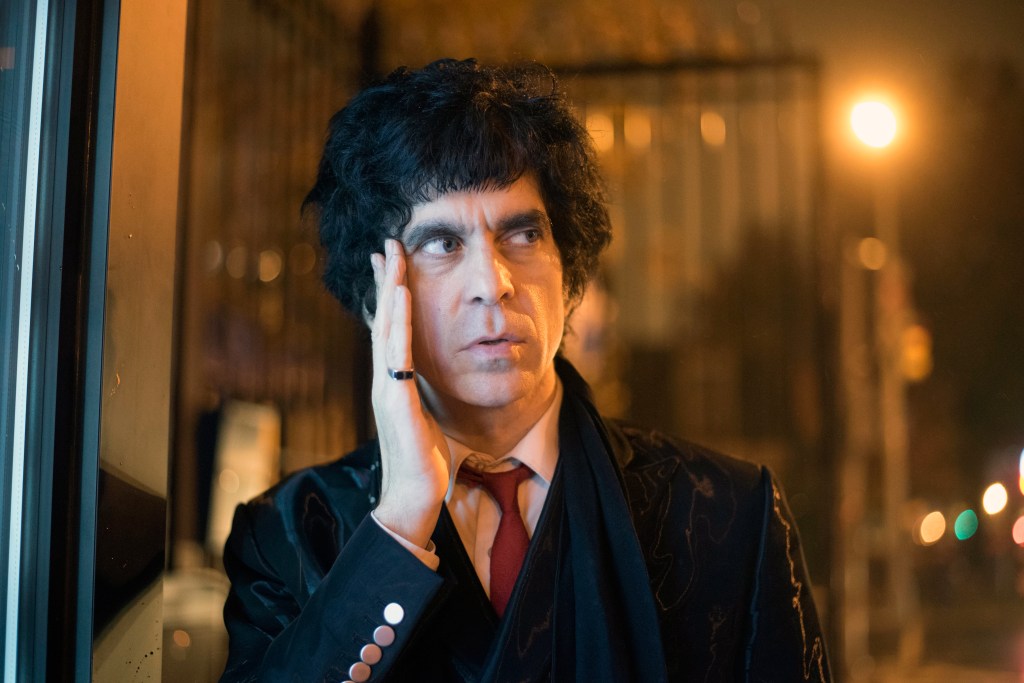It was Halloween in Queens and, after a seemingly endless summer, the party was confusingly cold. The function was in the DIY fortress called Knockdown Center, with dark, labyrinthine halls and tunnels reminiscent of a Hammer Film. The DJ and host was New York soul stalwart Jonathan Toubin. On one hand it was a retro Burger Records style party-rock atrocity; too many bands and not enough drummers who can play. On the other—like all of Toubin’s parties when I’m not being a grump—it was a vibrant community of true believers in the transcendent power of the beautiful dead language of Rock and Roll.
I was surrounded by younger handsome strangers who still believed in seasonal dress-up effort, bless their hearts, and the usual bar-rockers and ought-to-be-dead boys with performative sideburns I’ve been avoiding shaking hands with for over a decade. It was a relief to see garage types dressed as ghouls and goblins as opposed to their usual costumes of “hetero leather daddy at the beach” and “friend of a friend of Melody Nelson.” I told an old pal I ran into in the bar line that I was dressed “as an adult” and he rolled his eyes and hasn’t spoken to me since. It was honestly a good party, but I was cold and feeling my age and all that hair was making me self-conscious.
Videos by VICE
As the witching hour approached, Toubin’s longtime friend Ian Svenonius, took the stage. There was a large crowd, but the space was enormous and conversations rose to the cavernous ceiling. Escape-ism—as Svenonius calls his one-man band of a drum machine, backing tracks, and a guitar—had a rough road ahead. He didn’t appear daunted in the least. His hair, as the song says, was perfect. With the pulse of a needly Suicide synth behind him, Svenonius purred the first lines off the second song off of his new album, Introduction to Escape-ism, “Man, It’s lonely at the top.”

He yowled, he jumped, his suit was ludicrous, he tortured his guitar with chicken scratch Gang of Four violence, and within two choruses he had the first twenty rows singing call and response to songs that they’d never heard before. The room warmed up. To borrow some of the hyperbole that runs through Svenonius’ entire career, it was a triumph over weather itself.
Before the set, we talked, moving from room to room to escape noise and distraction. Though clearly to many in attendance, Svenonius in all the glory of his suit—a tight in all the right places street hustler ensemble, made of alligator or shark or pterodactyl or maybe the skin of weathered rockers who came before him— was the distraction. He talks in a forceful breathiness that can veer from wise-ass playfulness to high dudgeon in the turn of a phrase. The effect is like talking to a princeling whose spent enough time a pauper (or vice-versa) to know what’s up. Talking to him makes you want to appear smart.
He tells me that Escape-ism is “a culmination of a lifetime in the trenches.” After twenty years of collaboration and bands—Nation of Ulysses, Weird War, Cupid Car Club, Chain and The Gang (who also released their sixth album Experimental Music earlier this year), The Make-Up, Publicist, David Candy, XYZ—this is the first truly solo record, a wild proposition from the man who has literally written the book(s) on the majesty of being in a band. “I’ve been trying to make a spoken word record for years,” he offers as an explanation for how this album came together. “It always degenerates into Rock and Roll.” Slipping easily back into the does-he-mean-it-or-not penchant for overstatement that has marked his entire body of work, he says off-handedly, “It could really reinvigorate the whole medium.”

Svenonius has recently reunited his ‘90s yeh-yeh rave-up outfit, The Make-Up, to the universal joy of scenesters and aesthetes across the Rock spectrum. But, dynamite as The Make Up is and was, it’s hard to divorce people’s enthusiasms from the culture-wide ‘90s nostalgia that threatens to make baby boomers of us all. That’s not Svenonius’ fault, The Make Up are good as hell, and what gives people joy is a gift horse whose mouth is better left alone. But, as he could easily pay his rent to infinity with The Make Up, it’s doubly brave and worthy to follow that up with an odd minimal synth album.
Recorded on 8-track tape, while Svenonius had a flu “in March or April or something” in a couple days at Gaucho Studio, with only Zumi Rosow and Cole Alexander from Black Lips as guest musicians (on sax and one guitar solo respectively), Escape-ism still has the trappings that Svenonius holds sacred. “It still has a group name,” he says. “It’s a way for me to have freedom. There’s no committee. It’s a different sound. I don’t think it sounds like any record out there. Escape-ism can be anything, it can say anything. It can devolve into introspective noise or transform into speechifying like the Gettysburg Address. That’s why the people who like it, like it because there’s no restrictions.”
The album itself is brazen in both its forward and backward vision. While it does sound entirely singular, Svenonius is not shy about his points of reference. Suicide, if “Frankie Teardrop” was played pop, and repurposed Stooges riffs abound, while Ian slinks lyrics that are half arch seduction and half hep-cat insurrectionist manifesto, but both sides delivered with a pleading sincerity. “I deal in clichés entirely,” he says. “When I write a song I look at oldest rock and roll and think ‘this is how they did it.’ All the best groups are cover bands: Spacemen 3, The Gories, The Cramps, Stereo Total. The groups that really hit you are essentially cover bands. Why are they the best? Because they are using the familiar.” When I ask him about “originality,” he says, “When you meet a person you don’t need them to have three eyes… Good rock and roll can’t be too intellectual and it can’t have too many words. Escape-ism is a drum box and some words. It’s an incitement.”

Talking to Svenonius is amusingly treacherous. He has a penchant to talk in essays that, while fascinating, are occasionally summations of ideas he’s already written about. The interviewer runs the risk of plagiarizing the interviewee’s books ( The Psychic Soviet, Supernatural Strategies for Making a Rock ‘n’ Roll Group, and Censorship Now!), or at least adding redundancy to the lives Svenonius’ readership/fans. So a degree of cutting is required. He also peppers his sentences with numerous “you know”s which serve to both invite the listener into an exclusive intellectual cadre and make them occasionally pretend to know what is being referred to when they actually don’t have a clue.
“Good rock and roll can’t be too intellectual and it can’t have too many words”
He talks at length about Escape-ism as mind control, and it’s part of his stage patter, I get it, but on another level, I don’t, you know? But it seems a nod to the fact that the release of Introduction to Escape-ism—which came out on Merge Records earlier this month—comes at decidedly strange time. As ever, those in power lie with impunity, but now they seem to have dropped the pretense for objective truth entirely and those in opposition are expected to Mean It, Man at all times. But where does this leave those who, while aggressively on the correct side of whatever history you’ve got, were born to poke, to prod, to slyly set fire to the curtains of the mansion?
When I saw Escape-ism perform a few weeks after the Halloween show, at the Nocturne party in Williamsburg, he had the crowd in the palm of his hands, the responses to the calls on cue, until he shouted about how we had to stop being oppressed and had to “become the oppressors” and there was just a soft cough in response from the crowd. Crickets would have been more receptive. While it wasn’t quite Suicide getting pelted with bottles, it worked as strange provocation. But we, the audience, fans, humanity at large, don’t need to get everything about everybody and the show bounced back in less than a chorus.

Svenonius was born in Chicago, in 1968, to a pair of academics. His late father was a classical and opera fan and when I ask if his still living mother is a fan of his music, Svenonius says, “well, she’s not writing bad reviews online or anything.” For most of his life however, Svenonius has been associated with our nation’s capital, confounding expectations since his over-discussed but well-deserved role as ‘Sassiest Boy In America.” (Short version: there was a feminist teen girl magazine called Sassy. It ruled. Every winter they designated a particularly fine and unruly specimen “The Sassiest Boy In America.” Svenonius was 1991’s. Punks worldwide rejoiced and swooned. The ‘90s were wild.)
Svenonius, historically, doesn’t talk about his youth—“I don’t know why. It doesn’t seem interesting. I’ve always felt that a group is cool because rock is transformative”—which is fine as I‘m not terribly interested in people before they became interesting. But I asked about what music he was first passionate about growing up. He told me about when “my parents let some hippies live with us for a while, because they needed a place to live” there were records like Quicksilver Messenger Service and The Grateful Dead around that he badly wanted to get into, but that didn’t take. The Beatles did. I find that surprising as I’ve, for twenty odd years, attached the utmost importance to the lyrics on the first song off of his band Nation of Ulysses’ 1992 record Plays Pretty For Baby, “N-Sub Ulysses,” which read:
“I’m not talking about a Beatle’s song,
Written 100 years before I was born.
100 flowers bloom, 100 schools of thought contend,
C’mon baby, let’s hang around,
They’re talking about the round and round,
But who’s got the real anti-parent culture sound?”
When I ask Svenonius about this seeming contradiction, he simply says, “It’s a song about a submarine. But I had to make sure that people understood that it was different than a Beatles song about a submarine.” Which makes me laugh out loud at the power of a punk lyric. I probably pretended to hate The Beatles into my twenties based on that first line alone. Svenonius, not one neglect context, added, “There’s a lot of transportation songs in Rock and Roll, that’s a favorite metaphor, the train being inexorable, ‘Mystery Train’ or ‘My Baby’s On a Train.’ Or it’s a gospel device, about destiny or fate and then there’s all the car songs; ‘Rocket 88,’ that’s about individualism and freedom. And a submarine as a metaphor? That’s a Beatles innovation so when I was making the song I thought ‘well I gotta make sure to differentiate it…’”

When hardcore punk was increasingly becoming a death race to determine who was the most regular guy in the room, his band Nation of Ulysses’ 1991 debut 13-Point Program To Destroy America was a cacophonous call to adventure. Nation of Ulysses looked like hyper-sexualized mod cretins and sounded like they were making it up as they went along. Their two proper albums ( 13-Point and 1992’s Plays Pretty For Baby) are high points of end-times skronk and roll. One could (and should!) argue that NOU’s ideology of not looking like shit—all disheveled suits and exquisitely curated thriftware—indirectly led to both the ska and swing revivals. For myself, I’d be hard pressed to say whether it was Svenonius or Nick Cave who first introduced me to pomade. (It was probably an angel/devil on shoulder situation with both whispering, “do something about your hair.”)
After Nation of Ulysses, Svenonius formed Cupid Car Club, a band not entirely divorced from the sound of Nation of Ulysses and arguably a shedding device of whatever hardcore tendencies he was moving away from. His next band, The Make-Up, is probably—without polling numbers handy—the band he’s best known for. “The band introduced, you know, a soul rip-off into our milieu,” he says of their influence. “It’s not that’s an original idea in rock and roll but lots of people have said to me, ‘I was listening to emo and then…’ so, you know.”
With a career as long as his, the reverberations caused by Svenonius’ bands (the aforementioned ones and the “major” ones, Weird War, Chain and The Gang, that came after) is something to wrestle with. Stylistically, of course, his shadow looms. Bikini Kill and Huggy Bear, any other band that put out manifestos, echoed the situationist ethos. Orchid adopted the quasi-revolutionary stance. Rye Coalition embraced the NOU aesthetic wholeheartedly until the ostensibly more satisfying and presumably more profitable influence mines of early AC/DC beckoned.
Less predictably, as I always assumed his art fell squarely into the New York No Wave school exclusively, Matt McAuley, from the noisy electro-rock band A.R.E Weapons and TV Baby told me at the Nocturne show, “Are you kidding? NOU is tattooed on my brain and soul. I’ve lived too much of my life, intentionally or not, based on those lyrics.”
The Washington Post music critic Chris Richards—once a labelmate of Svenonius’ with his own band Q And Not U—has written extensively about Svenonius (including a particularly awkward correction in the Post when Svenonius’ voting records showed a different age than the one he claimed.). Richards talks, with a catching enthusiasm, about how important Svenonius was to his generation, as both larger than life character and as approachable punk enthusiast.
“Growing up, you heard about, in New York City, Lou Reed going to get a bagel,” Richards says. “Ian was our version of that. I think I met him on the sidewalk before I ever met him in a nightclub. You can still bump into him on the street. I love that. It’s one of my favorite things about living in Washington DC.”
“I don’t really drink wine but Ian is literally getting better with age,” Nick Zinner of the Yeah Yeah Yeahs.
Richards goes on to talk about Svenonius as a “lifer.” It’s easy enough to hold forth certain ideals, modes of living, when one is 19 and the future seems both endless and impossible. It’s another thing entirely to maintain an appetite for perpetual upheaval for decades. Making the case for Svenonius’ legacy, Richards says, “Look, contrarianism is not my cup of tea. But I read somewhere ‘Trolls don’t mean it, provocateurs do’ [Ian] shows that things can change by being a romantic, and railing against the boredom of the way we exist.”
When I ask Nick Zinner of Yeah Yeah Yeahs—whose guitar style shares Svenonius’ musical raw, historically minded adventurism, if not necessarily influenced by the man himself—where Svenonius resides in the landscape, he simply says, “I don’t really drink wine but Ian is literally getting better with age. Harder, funnier, classier, and more urgent. I do wish though that I saw Nation of Ulysses when they would come onstage with their shoes on fire.”
And when I tell Svenonius my girlfriend’s strong belief that no one should date anyone who doesn’t like at least one of his bands, he says, “That’s really good advice.”

Today, his feet only metaphorically aflame, Svenonius keeps an uneasy peace with the world, both big and small, around him. Escape-ism throbs with a sensual anger, hilarious and genuinely aggrieved in equal measure. Svenonius takes sly stabs at industry phonies and the gallery system that has poisoned the art world (and that he argues pretty convincingly is now prevalent through festivals, public relations, online media (hi!) in the music world) in “Almost No One (Can Have My Love)” while positioning himself as the eternal anti-square, clawing at what’s left of an oppositional culture.
Using lyrical tropes as inherently “rock” (or gospel) as waves (mentioned in two separate songs), fire, and the dependable and essential “you and me” against the inevitable and infernal “them.” The guitar moans and creeps like he’s the first to discover this alien instrument and the drums sometimes feel like little more than a click track, all that’s needed to keep that beat.
“Rome Wasn’t Burnt In A Day,” a version of which also appears on the most recent Chain and the Gang album, has a mutant “I Wanna Be Your Dog” riff and references to visigoths, which could have just been silly. Instead it’s a fuzzbox nursery rhyme, catchy enough to be a genetically imprinted memory. It ends with “Next time you feel like it’s all too much/Next time you feel ‘oh I’ve had enough’/Remember what they say…Rome wasn’t burnt in a day” and it’s as hopeful an affirmation as we can ask for or deserve. On “Iron Curtain,” reverb and tinny hi-hat provide creeptastic backdrop to an over-the-top ode to that last historical great bulwark against the free market and it’s adherents. Svenonius’ mix of perversity and class consciousness always needles and excites and, yes, even incites.
In his lyrics and writings, the use of Soviet imagery and arguably positive references to Mao can grate in a culture rich with despots (though I grow defensive when people unfamiliar with his approach, who don’t “get it,” criticize him for the same.). When we think of provocateurs now, it’s easy to immediately leap to tedious fascist fence walkers like Douglas P. of Death In June. But much of the fun of the ‘90s was people like Ian Svenonius and Lisa Crystal Carver embracing trash and provocation in ways that would get them burned at the social media stake today. I asked him about his use of Soviet imagery, in writings and lyrics, that can be read as fetishistic, but he pushes back a bit.
“It’s partly an empathy for Soviet existence and also schadenfreude for these titans of industry, that there were swathes of the world that they were forbidden from,” he says. “That just seemed cool, you know what I mean? This construct, the financial system, capitalism, that we’re supposed to just think is the natural order of things, that it’s a physical property of the earth. The idea that there was different values and rules in half of the world is exciting, like a different reality. And, growing up in the indoctrination, the propaganda,…look, in the middle ages, there were certain people who were Satanists. Whenever there is a hegemon, when one point of view that is insisted on…”
Ian Svenonius is best enjoyed when the listener makes the decision to go with what may come and to not parse every statement for levels of absurdity. Chris Richards says, “The thing that people say, ‘that guys putting me on; or he’s always in ‘character’…my response is that we’re always performing our identities for each other. We talk differently to our dentist than we do to our grandma. Ian has a hyperawareness to that divide and the more I get to know him, everything that makes him unique, seems like an expression of truth to me. Even if he is puffing out his chest, trying to make you laugh, trying to make you think differently; I still think that’s a core part of who he is.”

Whether Svenonius is entirely sincere or entirely correct is entirely beside the point, if you begin with the belief that world, especially a supposed “counterculture,” while needing justice and progressiveness, also needs the genuinely strange, the—fuck it—(non-racist/fascist) provocateur. I ask him whether he himself currently feels alienated from a culture where even those ostensibly on his “side” don’t have a lot affection for provocative jive and gleeful contradiction. “I always felt that way,” he says. “That’s the perspective of every band I’ve been in; it’s us against them, you and I against the world. It’s always underground. ‘We’re hanging out in someone else’s world.’ It comes from living where I do, which is a very alienated landscape. That’s what I’m used to so that’s what I’m comfortable with. I really hate consensus. I don’t want to be a contrarian. Consensus doesn’t feel good.”
Svenonius, to interpret a man who resists interpretation, is deadly serious about the joke of Rock music. His approach is that of the angriest, smartest, funniest teenage alien in the room. He rails against the CIA and Silicon Valley like he’s perpetually aghast that people refuse to believe what’s right in front of their eyes. His approach to music is, as the writer Liz Pelly said to me, “disrespectful to the guitar,” (in a good way). I asked Svenonius if there’s one constant thread running through all his albums, his decades-long catalog of Molotov cocktail juggling.
“Basically, I have one perspective through all my work, it’s one idea,” he says. “I just like music more and more. I just think it’s better and better. A lot of people get disappointed in music, that it didn’t redeem itself or live up to expectations but I think it’s really humanity’s greatest achievement; rock and roll music.” Then he laughed for a long time.
More
From VICE
-

(Allen J. Schaben / Los Angeles Times via Getty Images) -

Screenshot: Nintendo -

John Stanton/WireImage -

LongeviQuest
